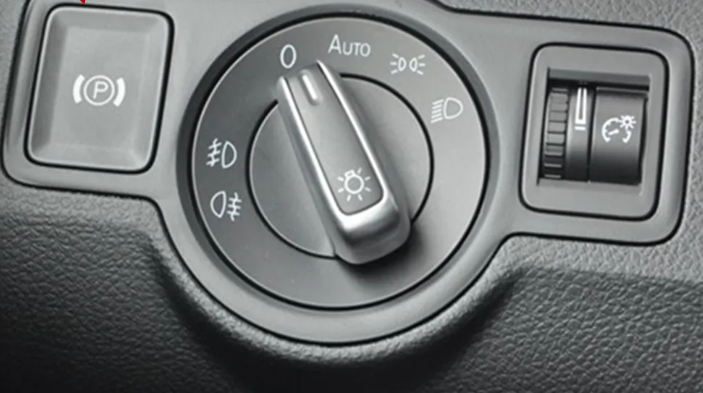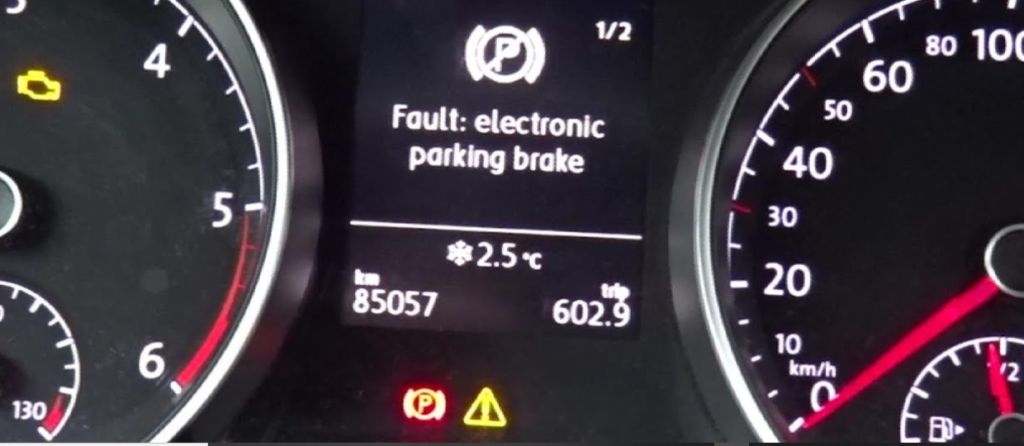Electronic Parking brakes are the smart version of the manual parking brake. They are much easier to use but tend to be a bit more finicky. Additionally, they are relatively expensive to repair when multiple components fail simultaneously. As such, you should always handle any electronic parking brake issues as soon as they arise.
Common Causes of VW Passat Electronic Parking Brake Problems & Their Fixes
Some causes of a malfunctioning electronic parking brake include faulty cables, a faulty battery, a defective motor, worn-out brake pads, poorly positioned brake shoes, and stuck brake components.
Faulty Cables
A faulty parking brake cable will not deliver enough pressure to the parking brake shoes or pad, which in turn affects the parking brake’s functionality.
Solution:
- Inspect the parking brake cable and replace or repair it.
To examine the cable,
- Use a floor jack or jack stand to lift your car.
- Once the parking brake cable is located, they’ll visually inspect it along the undercarriage for any wear or tear.
- Check if any bolts and mounts came loose.
- Check for signs of damage at connections where the rear brakes meet the rear cable.
- Check that the e-brake cable is in good condition and connected to the brake drum.
- Replace or reconnect a faulty cable.
Worn out Pads
Worn-out brake pads do not have enough grip to keep your vehicle in place when you engage the parking brake. When your car’s ECU module detects this, it will relay an error code on the infotainment screen.
Solution:
- Inspect the parking brake pads
To inspect the brake pads;
- Loosen the lug nuts on each rear wheel.
- Raise the vehicle off the floor.
- Remove the lug nuts on the rear wheel to remove the wheels.
- For vehicles with rear drums:
- Hit the side of the rear drums with a sledgehammer. This frees it up from the wheel studs.
- Remove the drums.
- Check if the rear brake shoe is broken or worn.
- If your car has a rear disc brake, remove the caliper and check the rear brake pads for wear.
- If your car has rear disc brakes but a drum parking brake mechanism, remove the disc brakes and the brake rotor (rear rotor) to access the drum parking brake.
- If the parking brake pads are damaged, replace them.
Poorly positioned Brake Shoes
Improperly positioned brake shoes won’t provide proper contact, resulting in a faulty parking brake.
Solution:
- Adjust the brake shoes.
How to Adjust Brake Shoes
Manually rotate the star wheel through a slot in the backing plate. This will help move the shoes away from the drum for removal or place them close to the drum after replacement.
Notes:
- Adjusting any brake shoe usually requires the removal of the wheel, brake drum, or rotor and brake caliper.
- A drum-type braking system has a star wheel. The star wheel “self-adjusts” the distance of the shoe from the drum when you apply the brakes during reverse motion.
Faulty Parking Brake Button
A stuck or damaged parking brake switch will not engage or disengage the parking brake when you press it.

Solution:
- Clean the button to see if it will start working.
- Then test the parking brake.
- Listen for a buzzing sound when you shut off the engine, as this indicates that the parking brake motor has engaged the parking brake.
- If this does not happen, replace the parking brake button.
- Or hire a professional to do it.
Weak or Faulty Battery
The parking brake uses power from the car battery to run its motor. If the battery is drained or old, the voltage will be too low to power the parking brake.
This may also happen if the charging system is not faulty. As a result, the control module will turn off the electric motor to prevent damage.
Solution:
- Test the battery and the alternator using a multimeter.
- Or visit a mechanic and have them test it for you.
- If the battery is bad, replace it.
- Also test the charging system using a multimeter to see if it is faulty.
- If the charging system is bad, replace it.
Defective Electric Motor
The electric parking brake uses an electric motor to engage or disengage the parking brake mechanism. If the motor is damaged, the electronic parking brake won’t engage or disengage when you press the button.
Solution:
You should visit an authorized auto shop to get them checked and replaced since electric motors require calibration after installation. And you may not have the right tools to test and replace your motor. There is also a risk of you damaging the brake wiring while attempting to replace the motor yourself.
Software Issues
The ECU software controls the parking brake; it can cause the brake to engage or disengage incorrectly if it has a bug. This can happen if the software is not properly updated or there is a compatibility issue between different components.
Solution:
- Update the software using certified software updates.
- If you cannot update, contact an authorized repair shop for assistance.
- Reset the parking brake system.
Damaged Brake Calipers
The brake calipers aid in stopping the vehicle when you depress the brake pedal. The parking brake will not work if the calipers are damaged.
Solution:
- Inspect the brake calipers and replace them if you can.
- Alternatively, take your car to a certified professional to inspect and replace your brake calipers.
Fault Wheel Speed Sensors
The wheel speed sensor, sometimes called the ABS sensor, receives information from the speed sensor and tone wheel about the speed of your vehicle’s wheels.
A faulty wheel speed sensor can cause the parking brake to malfunction, as the ECM may not receive accurate information about the wheel speed.

Solution:
- Inspect the wheel speed sensors and replace them if they are damaged.
Fault Parking Sensors
If the parking sensors are not working, the parking brake may not release when the driver presses down on the pedal. Or it will refuse to engage when you are in the middle of traffic.
Solution:
Take your vehicle to an auto shop to replace the parking brake sensors. This process is complicated and better handled by a professional.
Stuck Parking Brakes Components
Rust, dirt, debris, or cold and wet weather can cause your brakes to get stuck, which in turn causes the parking brake to malfunction. Since the parking brake consists of springs and cables inside a sheath, water can become trapped and freeze solid during freezing temperatures. This ice prevents the cable from sliding inside the sheath.
Solution:
- Inspect and clean the brake components.
- If they are stuck due to freezing, wait for them to thaw. Sometimes, starting your car and waiting for it to warm up may do the trick.
